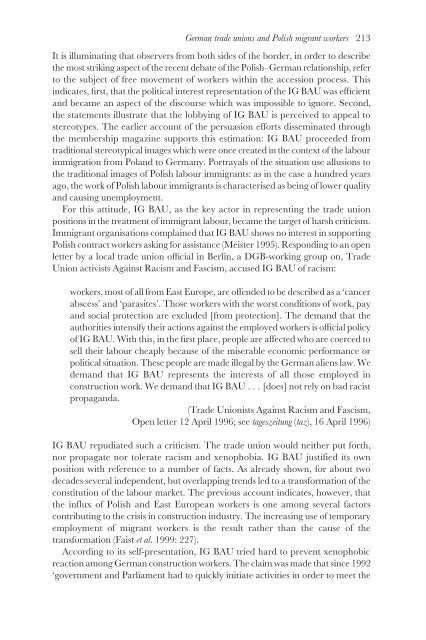Europeanisation, National Identities and Migration ... - europeanization
Europeanisation, National Identities and Migration ... - europeanization
Europeanisation, National Identities and Migration ... - europeanization
You also want an ePaper? Increase the reach of your titles
YUMPU automatically turns print PDFs into web optimized ePapers that Google loves.
German trade unions <strong>and</strong> Polish migrant workers 213<br />
It is illuminating that observers from both sides of the border, in order to describe<br />
the most striking aspect of the recent debate of the Polish–German relationship, refer<br />
to the subject of free movement of workers within the accession process. This<br />
indicates, first, that the political interest representation of the IG BAU was efficient<br />
<strong>and</strong> became an aspect of the discourse which was impossible to ignore. Second,<br />
the statements illustrate that the lobbying of IG BAU is perceived to appeal to<br />
stereotypes. The earlier account of the persuasion efforts disseminated through<br />
the membership magazine supports this estimation: IG BAU proceeded from<br />
traditional stereotypical images which were once created in the context of the labour<br />
immigration from Pol<strong>and</strong> to Germany. Portrayals of the situation use allusions to<br />
the traditional images of Polish labour immigrants: as in the case a hundred years<br />
ago, the work of Polish labour immigrants is characterised as being of lower quality<br />
<strong>and</strong> causing unemployment.<br />
For this attitude, IG BAU, as the key actor in representing the trade union<br />
positions in the treatment of immigrant labour, became the target of harsh criticism.<br />
Immigrant organisations complained that IG BAU shows no interest in supporting<br />
Polish contract workers asking for assistance (Meister 1995). Responding to an open<br />
letter by a local trade union official in Berlin, a DGB-working group on, Trade<br />
Union activists Against Racism <strong>and</strong> Fascism, accused IG BAU of racism:<br />
workers, most of all from East Europe, are offended to be described as a ‘cancer<br />
abscess’ <strong>and</strong> ‘parasites’. Those workers with the worst conditions of work, pay<br />
<strong>and</strong> social protection are excluded [from protection]. The dem<strong>and</strong> that the<br />
authorities intensify their actions against the employed workers is official policy<br />
of IG BAU. With this, in the first place, people are affected who are coerced to<br />
sell their labour cheaply because of the miserable economic performance or<br />
political situation. These people are made illegal by the German aliens law. We<br />
dem<strong>and</strong> that IG BAU represents the interests of all those employed in<br />
construction work. We dem<strong>and</strong> that IG BAU . . . [does] not rely on bad racist<br />
propag<strong>and</strong>a.<br />
(Trade Unionists Against Racism <strong>and</strong> Fascism,<br />
Open letter 12 April 1996; see tageszeitung (taz), 16 April 1996)<br />
IG BAU repudiated such a criticism. The trade union would neither put forth,<br />
nor propagate nor tolerate racism <strong>and</strong> xenophobia. IG BAU justified its own<br />
position with reference to a number of facts. As already shown, for about two<br />
decades several independent, but overlapping trends led to a transformation of the<br />
constitution of the labour market. The previous account indicates, however, that<br />
the influx of Polish <strong>and</strong> East European workers is one among several factors<br />
contributing to the crisis in construction industry. The increasing use of temporary<br />
employment of migrant workers is the result rather than the cause of the<br />
transformation (Faist et al. 1999: 227).<br />
According to its self-presentation, IG BAU tried hard to prevent xenophobic<br />
reaction among German construction workers. The claim was made that since 1992<br />
‘government <strong>and</strong> Parliament had to quickly initiate activities in order to meet the



